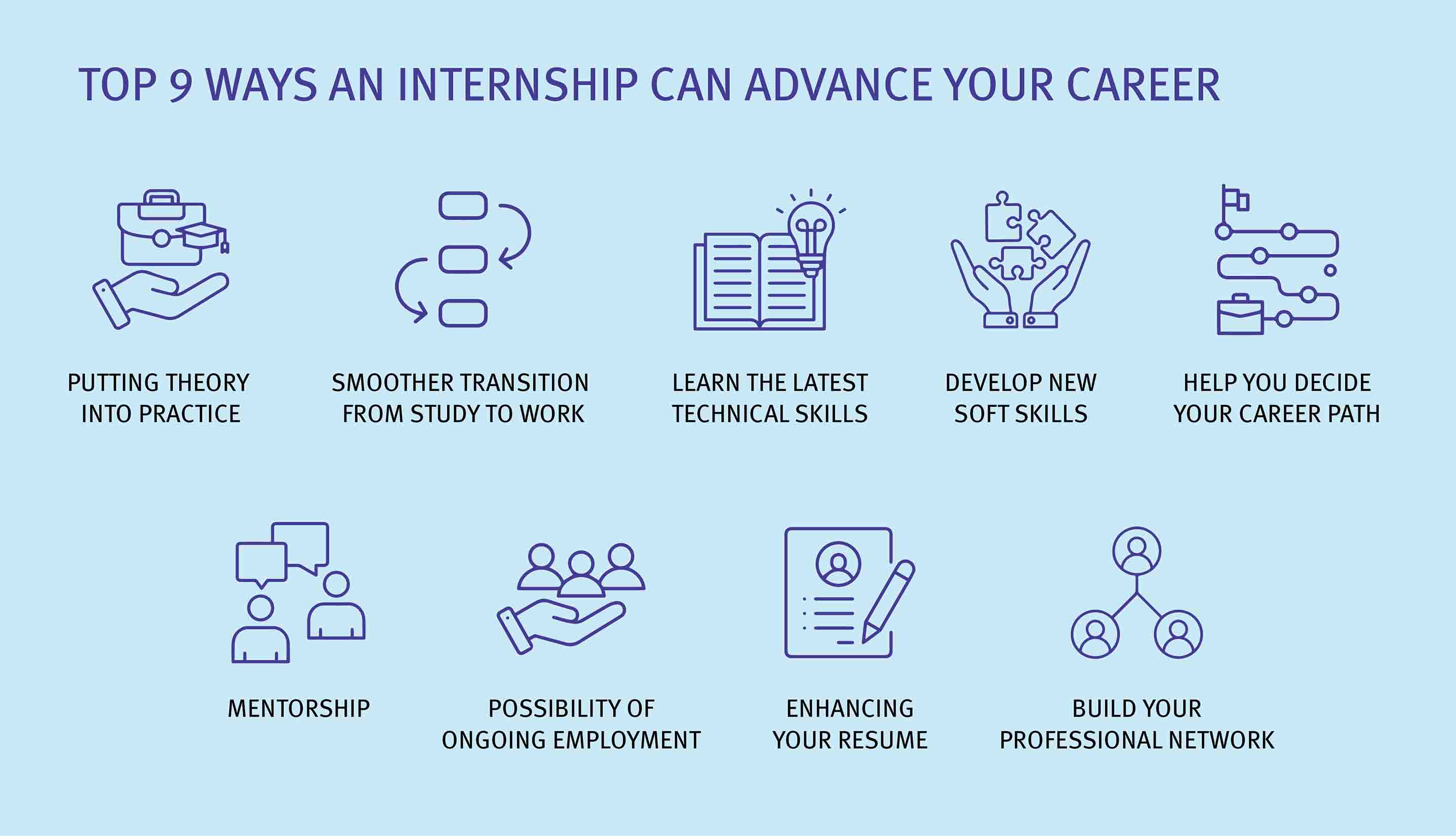The top 9 ways an internship can advance your career
An internship is an opportunity to gain real-world experience for your chosen career. It is a supervised program structured on what you want to learn and achieve.
If you’re an international student, an internship allows you to immerse yourself in a professional environment of the country you’re studying in and to adapt to a different work culture.
To find internships you can look at company websites, job search websites, or your school may organise internships that count as part of your coursework.
Here are the top 9 ways an internship can advance your career.

1. Putting theory into practice
You will gain theoretical knowledge at university. An internship will help you retain that information with opportunities to apply what you’ve learned in a professional environment. The business theories you learn could be used to help with solving a business problem. Your knowledge of writing code could be used to help develop a website.
During your internship, there are more practical things to learn. You can observe how teams work together, collaborate on a new product or service from conception to delivery or be introduced to new operation systems.
2. Smoother transition from study to work
Learning at university and working in a business environment are different. An internship is the bridge that provides a smoother transition from study to work. This is because during an internship you will gain real-world knowledge, industry experience, technical skills and soft skills which will help you adapt to working life after you graduate.
You have opportunities to work with experienced professionals who can answer all your questions, provide valuable feedback, and help you improve your skills. The more time you spend in a professional work environment, the more settled and confident you will become in your abilities.

3. Learn the latest technical skills
In an internship, you may be taught new technical skills for a specific role. Even though universities will try to include as many industry updates as possible in their program, businesses and their operating tools evolve and change faster than what can be taught, especially with the increasing use of Artificial Intelligence and other technologies.
You can gain access to a wider range of online resources. For example, an IT intern can gain access to the premium version of computer software, or an analytics intern can access modelling software that universities have yet to include in their program.
4. Develop new soft skills (transferable skills)
When you study at university, you will start developing soft skills (also known as transferable skills) such as time management and the ability to communicate clearly. When you work, you develop these skills further.
To succeed in any profession, you need know how to work in a team and be collaborative. You need to be a critical thinker, handle multiple projects and deadlines, and problem-solve. You are expected to take initiative and perform at a high standard. Your time at an internship will help you build up these essential transferable skills.
5. Helps you decide your career path
Internships give you opportunities to work in different industries and roles for a short period. They can help you decide what you like or don’t like about an industry, and roles that are a good fit for you. The more time you spend in a real-world environment, the more you learn which career path you wish to pursue.
Even if your internship may not relate directly to your career path, the professional experience you gain will help you be competitive in the job market.
"Internships are challenging—they’re designed to be. They offer a unique opportunity to test your passions and discover your professional likes and dislikes, providing vital clarity for your career path.”
~Will Phelan, National Careers Manager, Kaplan Business School
6. Mentorship
In an internship you will have a supervisor or mentor to discuss your career goals with. They can help you identify your strengths and weaknesses, provide advice, and teach you valuable skills for career progression.
7. Possibility of ongoing employment
Internships allow managers to see if you could be an employee that adds value to the business. If they are impressed with your work and work ethic, the company may offer you permanent employment.

8. Enhancing your resume
Any experience where you gain or use skills relevant to your career should be added to your resume. So, you can add your internship experience. List the key duties, projects, skills you gained and any achievements. Ask your supervisor if you can list them as a referee. List your internship on your LinkedIn profile too.
Employers will look favourably on the work experience you completed in an internship, giving you a competitive advantage with other applicants.
9. Build your professional network
Through your internship, you will meet professionals with industry experience. You get to learn what strategies they use to succeed or take on a business challenge. They can teach you how to work with different people and in various work situations.
If your colleagues are impressed with your work, they could recommend you for other roles or put you in touch with their own professional network. Remember to stay connected with them (e.g. through LinkedIn) even after the internship ends.
Interested in more career advice? Read our Business Career Guide or learn more about the benefits of an Academic Internship at KBS.









